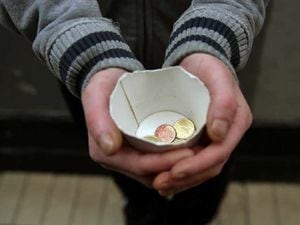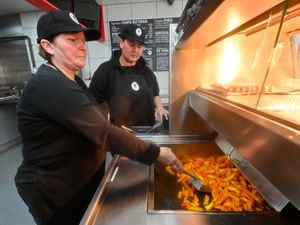Don’t give cash to street beggars, Wolverhampton's public health boss warns
People in Wolverhampton are being told not to give money to street beggars who present themselves as being homeless, in order to stop the problem leading to more aggressive demands for cash from members of the public.

City health chiefs say large numbers of people in the city are still choosing to sleep rough – despite the council’s repeated efforts to increase accommodation for homeless people, along with its pledge that “none of our citizens ever needs to be on the streets”.
In a recent late-night investigation conducted by Wolverhampton Council officials at five locations across the city, a number of people found sleeping rough were not actually homeless and had accommodation available to them, provided by various local organisations.
Director of public health John Denley told this week’s meeting of the council’s Climate Change, Housing and Communities Scrutiny Panel: “The people that are out there aren’t rough sleepers – they are begging for resources. Wherever there’s a market you will get a response, because the market will be people giving at that point. And there is no other greater example of that than during Covid.
“Patterns of begging changed from – and hopefully people will have noticed this – being in a busy high street, which wasn’t busy during Covid, being at junctions and lights. And that’s becoming more and more prevalent. Begging is responsive to the market we create.
“So the key message to the public is not to give money – or give money to alternative givings. The more we reinforce by giving, the more we sustain a way of living which perpetuates and there will be a poorer outcome.
“Getting an understanding of whatever is going on with whoever is on the streets – understanding what their need is – through our partnership we are able to allocate the right interventions,” he added.
Councillor Stephanie Haynes said: “I agree that not all homeless people beg and not all people who beg are homeless, but some are. Aggressive begging is a problem and it’s usually around the banks, because they know to go there as that’s where people have gone to take money out.”
Head of homelessness and migration Anthony Walker, who presented a report on rough sleeping to the panel, said members of the public should adopt a ‘conversation not coins’ approach to people on the streets, by signposting or donating to homeless charities such as P3.
Chair Cllr Anwen Muston added: “I’ve had a number of people come across to me begging, and when I say ‘are you homeless?’ and they say ‘yes I am’, I’ve told them that I am one of their councillors and would they like to come with me to the Civic Centre so we can find them somewhere to live, they have closed up straight away.
“This is where members of the public get duped into falsely thinking that people are homeless and this is something that we need to combat.”
Cllr Greg Brackenridge told members: “This is probably the most complex problem the council will deal with. It is a blight on the individual and it really does ruin lives as we have all seen. I have got concerns that this could be on the increase very soon when we look at how the economy is going along with the housing crisis. I do think we need to be preparing for that.
“We already know that we have got many thousands of people across the country who are sofa surfing – 24 hours away from homelessness – so I do think we need to be strategising for it. I am concerned that there are people who are coming out of prison who are giving false addresses – we really need to be working more with probation there.
“We need them to vet addresses properly before they release people. People are given an address but then, in effect, they could be in a worse position than they were before because they are not getting warm, they are not getting three meals a day and they are not getting shelter,” he added.
Mr Walker said the majority of people sleeping rough in the city were not homeless and that other factors – including mental health, substance misuse, negative relationships with peers and peaks in crisis – stopped them from using their settled accommodation.





